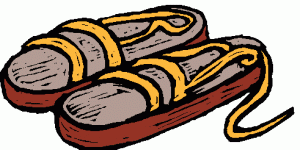[The Bible is an “Eastern” book. It was written many years ago in the “East” which today we refer to as “The Middle East.” As such, there are many customs and idioms that are not familiar to the “Western” mind.]
There is an interesting story in the gospel of Matthew in which Jesus sends Peter to catch a fish. Jesus told Peter that there would be money in the fish’s mouth and that they would then use that money to pay the tribute tax.
Now some may wonder, especially if you like to go fishing, how could there be money in a fish’s mouth? Many answer that question by saying that God, by way of a miracle, just put some money in that fish’s mouth.
Once again, understanding the eastern culture in which the Bible was written helps us to understand the story.
Musht Fish
 There is a fish in the east called the Musht. It is a small fish about six inches long with a large head. It also has what you would call a bag, or a pouch under its mouth.
There is a fish in the east called the Musht. It is a small fish about six inches long with a large head. It also has what you would call a bag, or a pouch under its mouth.
I have read that after new Musht hatch, the parents keep the new fish in the pouch for a short while to protect them. Then when it is time, the parent fish will begin to pick up pebbles from the bottom of the sea and put them into the pouch. This is done so the new fish will not be so comfortable – it’s time for them to leave home!
These Musht fish basically eat plankton, so at certain times of the year you can find them in very shallow water. At times they do pick up shiny items. Coins, gold or diamonds are shiny items.
How Do Coins Get In The Water?
In Bible times offerings to God were taken very seriously. There were those who wanted to give an offering but did not want to receive any recognition for it. Many believed that if you received praise from men then you had already received your reward now in this world. They wanted to receive their reward in the next world.
So, in order to keep it private, many would throw their offerings into the waters. Throwing their offerings into what were considered “holy waters” would be best. But, depending on where one would be, any water would do.
3 Coins In A Fountain
Today there is a tradition of throwing coins into a fountain for “good luck.” Perhaps the most famous is the Trevi Fountain in Rome. When I saw it last year there were a lot of coins in there. In fact, they say that approximately 3,000 Euros are thrown into that fountain each day.
Many believe this tradition of throwing coins into fountains goes way back to Biblical times when offerings were thrown into “holy waters.” The Ganges River is considered a holy river. Many years ago someone estimated there was more wealth, from years and years of offerings, in that river than in all India.
Peter Sent To Catch A Fish
In the Bible account that we are considering, Jesus told Peter to go to the sea, cast in a hook, and take the first fish that came up. He went on to tell him that when he opened the fish’s mouth he would find a piece of money.
This must have been exciting for Peter. He was a fisherman. He knew it was possible for this type of fish to have a coin. He also knew it was pretty rare to catch one that had a coin. The Bible doesn’t say if he had ever caught one of these and found a coin before.
The Miracle
It was not a miracle that the fish had a coin. The miracle was that it was the first fish that Peter caught. Can you imagine him there all afternoon on the shore; casting in his hook, catching a fish, checking for a coin, and finding nothing?
But Peter didn’t argue. He didn’t doubt. He believed what Jesus told him.
We too can have confidence in God’s promises. We can accept that what God has promised us is true. We don’t need to doubt, we just need to believe that He can and will supply all our needs.
Matthew 17:24-27
And when they were come to Capernaum, they that received tribute money came to Peter, and said, Doth not your master pay tribute?He saith, Yes. And when he was come into the house, Jesus prevented him, saying, What thinkest thou, Simon? of whom do the kings of the earth take custom or tribute? of their own children, or of strangers?
Peter saith unto him, Of strangers. Jesus saith unto him, Then are the children free.
Notwithstanding, lest we should offend them, go thou to the sea, and cast an hook, and take up the fish that first cometh up; and when thou hast opened his mouth, thou shalt find a piece of money: that take, and give unto them for me and thee.
Feel free to leave a comment, even if it’s a fishing story of your own. I have a few of those and maybe you do too. We’d love to hear what you have to say.
For more “Eastern Eye” articles, Click Here, or click The Eastern Eye tab above.
Mike Verdicchio
______________
There are a number of books that you can read to get insight on customs, manners, idioms and meanings from the eastern culture in which the Bible was written. The best I know of were written by by Bishop K. C. Pillai. I have had the pleasure of listening to recorded teaching by him.
He wrote three books, and they are hard to find, and are usually over priced. But, if you want to you can check this link to see what Amazon has to offer. Light Through an Eastern Window
Another great resource that I have used for years is a book called, “Manners and Customs of the Bible,” by James Freeman. Mine was printed in 1972 and I know they have newer additions. For the newest edition, just click the link and it will take you to Amazon. The New Manners and Customs of the Bible (Pure Gold Classics)




